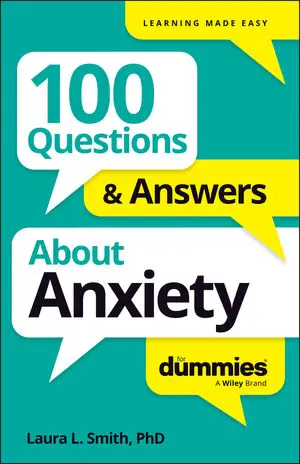 © Billion Photos / Shutterstock.com
© Billion Photos / Shutterstock.comHow to identify anxiety in your thoughts, feelings, and behavior
Part of coping with anxiety involves identifying how anxiety affects how you think, feel, and behave. Take a look at the following three lists and note whether any of the experiences apply to you.
You’re thinking anxiously if you’re . . .
- Worrying too much about pleasing other people
- Constantly thinking about “what if?”
- Believing you need to be perfect
- Thinking you can’t cope
- Making dire predictions about the future
You’re feeling anxious if you’re…
- Experiencing butterflies in your stomach
- Feeling muscle tension in your neck and shoulders
- Feeling out of sorts and dizzy
- Feeling shaky
- Experiencing rapid heartbeat
- Having sweaty palms
You’re behaving anxiously if you’re . . .
- Frequently turning down invitations
- Arriving late and leaving early from social events
- Avoiding things that make you nervous
- Not starting projects because you’re worried you could fail
- Having trouble getting yourself to do anything about your anxiety
Question your anxious thoughts
The words you use to think about yourself and the world can contribute to your anxiety. When you take some time to examine your anxious thoughts, your anxiety may decrease. If your mind is filled with worries, try asking yourself the following questions:
- How will I think about this concern six months from now? How about in a year?
- Have I had this worry before only to discover that what I worried about never actually occurred?
- Do I have any real, solid evidence that supports my worry? How about any evidence that suggests my worry is misplaced?
- What advice would I give to a close friend of mine who had my same worry?
- If my worry actually happened, could I find a way to cope with it? If so, how?
Take action against your anxious avoidance
When you find that you’re avoiding important life events or opportunities as a result of your anxiety, it’s time to take action. By taking small steps to change your behavior, you can challenge your avoidance. To begin, try the following:
- Analyze what you’re avoiding. For example, if you’re afraid of social gatherings, think about every component of what you dread: talking, eating in front of others, losing control, feeling squeezed, approaching other people, and feeling trapped.
- Break the components of what you dread into small pieces. For example, eating in front of others could involve holding a drink, serving yourself from a buffet, or eating a small finger food. Do one of these actions at a time.
- Rank those components from least to most distressing. Work your way through the list.






